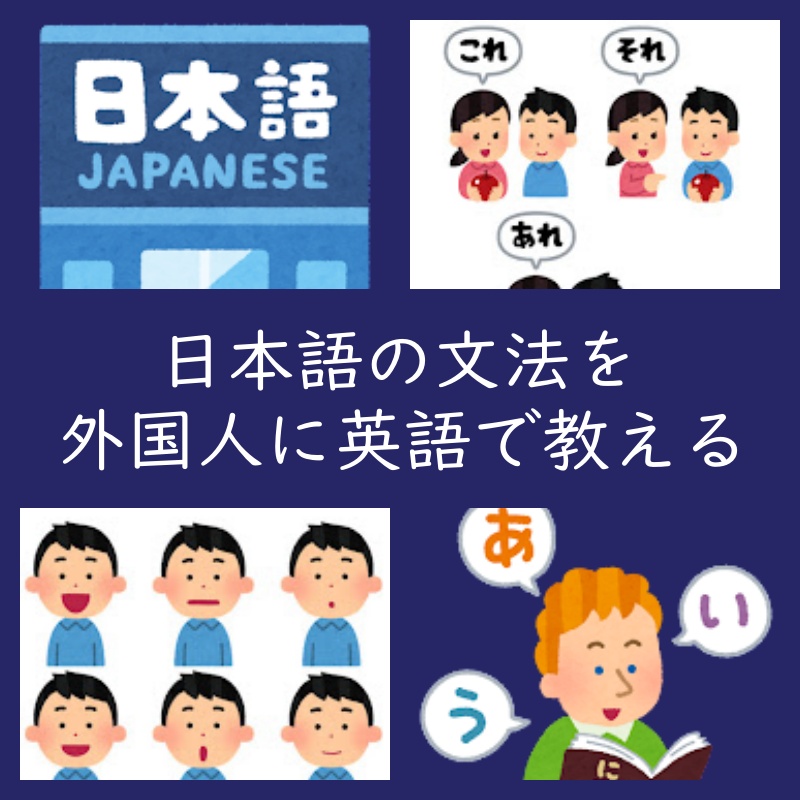ここでは、日本語の動詞について述べます。

Lesson1: どうし(verb)3グループ
動詞を3つにグループ分けします。グループごとに動詞の活用の仕方が違うからです。例外もありますが、以下の規則で覚えると良いでしょう。The verbs are grouped into three groups. The reason is that each group has a different way of conjugating verbs. There are exceptions, but the following rules are good to remember.
ここでは辞書形の動詞からグループ分けします。
Here we group the verbs from the dictionary form.
Group1 : U-verbs
基本として、Group2 以外で、uで終わる動詞。Basically, any verb ending in u, except Group2.
<<10 examples>>
- 飲む|のむ|nomu|to drink
- 書く|かく|kaku|to write
- 読む|よむ|yomu|to read
- 会う|あう|au|to meet
- 話す|はなす|hanasu|to speak
- 遊ぶ|あそぶ|asobu|to play
- 聞く|きく|kiku|to listen
- 泳ぐ|およぐ|oyogu|to swim
- 行く|いく|iku|to go
- 歩く|あるく|aruku|to walk
<<Exception 4 examples>>
- 座る|すわる|suwaru|to sit down
- 登る|のぼる|noboru|to climb
- 滑る|すべる|suberu|to slip
- 帰る|かえる|kaeru|to go back
Group2 : Ru-verbs
11 examples
“-e ru”と”-i ru”の形で構成されている。It consists of the forms “-e ru” and “-i ru.”
- 食べる|たべる|taberu|to eat
- 開ける|あける|akeru|to open
- 寝る|ねる|neru|to sleep
- 教える|おしえる|oshieru|to teach
- 始める|はじめる|hajimeru|to start
- 出かける|でかける|dekakeru|to go out
- 覚える|おぼえる|oboeru|to memorize
- 見せる|みせる|miseru|to show
- いる|いる|iru|to be
- 起きる|おきる|okiru|to get up
- 走る|はしる|hasiiru|to run
Group3 : Irregular verbs
2 irregular verbs
おぼえましょう!
- する|する|suru|to do
- 来る|くる|kuru|to come
「する」は名詞と合わせて動詞として使うので、その場合も同じです。例えば、The same is true for 「する」, since it is used as a verb in combination with a noun. For example,
- 勉強する|べんきょう する|to study
- 料理する|りょうり する|to cook
- 運動する|うんどう する|to exercise
Lesson2: Reasons for grouping verbs
日本語表現の例を見ながら、グループごとに動詞の活用の仕方を見て行きましょう。これが、動詞をグループ分けする理由になります。Let’s take a look at how verbs are conjugated in each group by looking at examples of Japanese expressions. This is the reason for grouping verbs.
簡単のために、グループ1と2を見てみましょう。Let’s look at groups 1 and 2 for ease.
<<ます形 masu form / polite form>>
G1: おちゃを のみます。nomi-masu。I drink tea.
G1: ほんを よみます。yomi-masu。I read books.
G2: ごはんを たべます。tabe-masu。I eat rice.
G2: えいごを おしえます。oshie-masu。I teach English.
<<ない形 nai form / negative form>>
I do not do ~.
G1: おちゃを のまない。noma-nai。I don’t drink tea.
G1: ほんを よまない。 yoma-nai。I don’t read books.
G2: ごはんをたべない。tabe-nai。I don’t eat rice.
G2: えいごを おしえない。oshie-nai。I don’t teach English.
<<意向形 volitional form>>
Let’s do ~!
G1: おちゃを のもう。nomo-u。Let’s drink tea.
G1: ほんを よもう。yomo-u。Let’s read books.
G2: ごはんを たべよう。tabe-you。Let’s eat rice.
G2: えいごを おしえよう。oshie-you。Let’s teach English.
以上は単なる一例ですが、グループによって活用の仕方が違うことが分かります。言い換えると、グループの中では活用の方法は同じです。これがグループ分けをする理由です。The above is just an example, but it shows that different groups have different ways of conjugating. In other words, within a group, the way of conjugation is the same. This is the reason for the groupings.
Lesson3: ます形:ます/ません
現在形活用 present tense conjugation
It is easy to turn a “ます” into a negative form. You erase the “す” and add the “せん”. That’s it.
~ます+せん
↓
~ません (present, negative)
Group1: U-verbs
u|-i-masu|-i-masen
| Dictionary
form |
Present,
affirmative |
Present,
negative |
| 飲む nomu | 飲みます | 飲みません |
| 読む yomu | 読みます | 読みません |
| 話す hanasu | 話します | 話しません |
| 聞く kiku | 聞きます | 聞きません |
| 行く iku | 行きます | 行きません |
| 帰る kaeru | 帰ります | 帰りません |
<<れいぶん(Examples)>>
- コーヒーを 飲みます。I drink coffee.
- コーヒーを 飲みません。I do not drink coffee.
- 彼女は がっこうに 行きます。She goes to school.
- 彼女は がっこうに 行きません。She does not go to school.
Group2: Ru-verbs
Ru|-e-masu|-e-masen
Ru|-i-masu|-i-masen
| Dictionary
form |
Present,
affirmative |
Present,
negative |
| 食べる taberu | 食べます | 食べません |
| 開ける akeru | 開けます | 開けません |
| 寝る neru | 寝ます | 寝ません |
| 教える oshieru | 教えます | 教えません |
| いる iru | います | いません |
| 起きる | 起きます | 起きません |
<<れいぶん(Examples)>>
- 私は パンを 食べます。I eat bread.
- 私は パンを 食べません。I do not eat bread.
- 彼は 10じに 寝ます。He goes to bed at 10:00.
- 彼は 10じに 寝ません。She does not go to bed at 10:00.
Group3: Irregular-verbs
u|-i-masu|-i-masen
| Dictionary
form |
Present,
affirmative |
Present,
negative |
| する | します | しません |
| 勉強する
benkyo-suru |
勉強します | 勉強しません |
| 料理する
ryori-suru |
料理します | 勉強しません |
| くる | きます | きません |
<<れいぶん(Examples)>>
- 私は まいにち 勉強します。I study every day.
- 私は まいにち 勉強しません。I do not study every day.
- あなたは にちようびに きます。You come on Sunday.
- あなたは にちようびに きません。You do not come on Sunday.
\英語で日本語を学べる定番テキスト/
Lesson4: Adverbs of frequency of action いつも、よく、ときどき、ぜんぜん
- いつも~verb+ます。│always, usually
- よく~verb+ます。│oftern
- ときどき~verb+ます。│sometimes
- あまり~verb+ません。│don’t much
- ぜんぜん~verb+ません。│don’t at all
<<れいぶん(Examples)>>
- 私は いつも うんどうします。I always exercise.
- 私は よく おちゃを 飲みます。I often drink green tea.
- 私は ときどき なっとうを食べます。I sometimes eat natto.
- 私は あまり やさいを 食べません。I don’t eat much vegetables.
- 私は ぜんぜん にくを 食べません。I don’t eat meat at all.
<<れんしゅう>>
例文に従って問題に答えよう。
Answer the questions according to the examples.
れい examples
Q1)わたし/いつも/7じ/おきる(to get up)
A1)わたしは いつも 7じに おきます。I usually get up at 7:00 a.m.
Q2)かのじょ/ぜんぜん/いちご/たべる(to eat)
A2)かのじょは ぜんぜん いちごを たべません。
もんだい questions
1)わたし/よく/テレビ/みる(to watch)
2)かれ/ときどき/にほんご/はなす(to speak)
3)いもうと/あまり/びょういん/いく(to go)
4)わたし/ぜんぜん/かんこくご/べんきょうする(to study)
5)おとうさん/いつも/しんぶん/よむ(to read)
6)ジェリー/よく/わたし/ねる(to sleep)
7)ねこ/ぜんぜん/およぐ(to swim)
Lesson5: ます形:ました/ませんでした
過去形活用 past tense conjugation
~ます+した。
~ました。past affirmative
~ます+せんでした。
~ませんでした。past negative
<<れいぶん>>
- きょう ともだちに あいました。I saw my friend today.
- きょう ともだちに あいませんでした。I did not see my friend today.
Group1: U-verbs
| Dictionary
form |
Past,
affirmative |
Past,
negative |
| 飲む nomu | 飲みました | 飲みませんでした |
| 読む yomu | 読みました | 読みませんでした |
| 話す hanasu | 話しました | 話しませんでした |
| 聞く kiku | 聞きました | 聞きませんでした |
| 行く iku | 行きました | 行きませんでした |
| 帰る kaeru | 帰りました | 帰りませんでした |
<<れいぶん(Examples)>>
- 私は コーヒーを 飲みます。I drink coffee.
- 私は コーヒーを 飲みません。I do not drink coffee.
- 私は コーヒーを 飲みました。I drank coffee.
- 私は コーヒーを 飲みませんでした。I did not drink coffee.
Group2: Ru-verbs
| Dictionary
form |
Past,
affirmative |
Past,
negative |
| 食べる | 食べました | 食べませんでした |
| 開ける | 開けました | 開けませんでした |
| 寝る | 寝ました | 寝ませんでした |
| 教える | 教えました | 教えませんでした |
| いる | いまました | いませんでした |
| 起きる | 起きました | 起きませんでした |
<<れいぶん(Examples)>>
- 私は パンを 食べます。I eat bread.
- 私は パンを 食べません。I do not eat bread.
- 私は パンを 食べました。I ate bread.
- 私は パンを 食べませんでした。I didn’t eat bread.
Group3 Irregular-verbs
| Dictionary
form |
Past,
affirmative |
Past,
negative |
| する | しました | しませんでした |
| 勉強する | 勉強しました | 勉強しませんでした |
| 料理する | 料理しました | 料理しませんでした |
| くる | きました | きませんでした |
<<れいぶん(Examples)>>
- 私は まいにち 料理します。I cook everyday.
- 私は まいにち 料理しません。I don’t cook everyday.
- 私は まいにち 料理しました。I cooked everyday.
- 私は まいにち 料理しませんでした。I didn’t cook everyday.
Lesson6: ます形:~ましょう/~ましょうか/~ませんか
~ましょう
一緒に何かをするよう誘う時に使います。Used to invite people to do something together.
~ます+しょう
~ましょう。
- コーヒーを のみましょう。 Let’s drink coffee.
- あさごはんを たべましょう。Let’s Eat breakfast.
- きゅうけい しましょう。Let’s take a break.
<<れんしゅう>>
Please translate the following English into Japanese.
- Let’s start the lesson.
- Let’s study the kanji.
~ましょうか
手伝いを申し出る時に使います。Used when offering to help.
~ます+しょうか。
~ましょうか。
- にもつを もちましょうか?Shall I carry your luggage?
- しゃしんを とりましょうか?Shall I take a photo?
- ドアを あけましょうか?Shall I open the door?
<<れんしゅう>>
Please translate the following English into Japanese.
- Shall I open the door?
- Shall I lend you an umbrella?(lend : かす)
~ませんか
相手を誘う時に使います。It is used to invite a person to join you.
~ます+せんか。
~ませんか。
- うみに いきませんか。Would you like to go to the beach?
- えいがに いきませんか。Would you like to go to the movies?
- いっしょに おどりませんか?Would you like to dance with me?
<<れんしゅう>>
Please translate the following English into Japanese.
- Would you like to go home together?(go home : かえる)
- Would you like to cook together?(cook : りょうりする)
Lesson7: Particles
を
を(Direct Object)
他動詞の表す動作の対象に「を」を付ける。Add 「を」 to the object of the action expressed by the transitive verb.
<<れいぶん>>
- 私は よく 水を 飲みます。I often drink water.
- 彼は ときどき 本を 読みます。He sometimes reads books.
- たなかさんは やさいを 食べません。Mr. Tanaka does not eat vegetables.
で
で(Place of action)
<<れいぶん>>
- 私は ときどき としょかんで 本を 読みます。I sometimes read books at the library.
- あしたは ホテルで ランチを 食べます。Tomorrow I will have lunch at the hotel.
に
に(Goal of movement)
<<れいぶん>>
- ジェリーさんは きょう ぎんこうに 行きます。Gelly will go to the bank today.
- きょうは うちに かえりません。I will not go home today.
に(Time)
<<れいぶん>>
- 私は まいあさ 7じに おきます。I get up at 7:00 every morning.
- 彼女は げつようびに かんこくに 行きます。She will go to Korea on Monday.
- あしたは 12じころに そこに つきます。I will get there tomorrow around 12:00.
<<ちゅうい!Note!>>
時間だとしてもある瞬間をしめすものや定期的な間隔を示す場合は「に」をつかいません。Even if it is time, “ni” is not used to indicate a certain moment or a regular interval.
きょうtoday、あしたtomorrow、ことしthis year、まいにちeveryday、まいばんevery night、いつwhen など
- わたしは あした びょういんに 行きます。I will go to the hospital tomorrow.
- わたしは おこめを まいにち 食べます。I eat rice every day.
へ
行く、来る、帰るの動詞と共に使われます。読み方は「え」です。It is used with the verbs to 行く, 来る, and 帰る. Please note that its pronounciation is 「え」.
へ(Goal of movement)
<<れいぶん>>
- 私は3がつに 日本へ 帰ります。I am going back to Japan in March.
- きんようびに うちへ 来ますか?Will you come to my house on Friday?
=スポンサーリンク=
Lesson8: Nがあります/います
When you want to say there is(are) “Noun”, you can use the verbs あります and います。
| Dictionary
form |
ます
form |
たいしょう
object |
| ある to exist | あります | non-living things |
| いる to exist | います | living things
(people, animal, etc) |
あります(non-living things)
→テレビ、かばん、いすchair、はなflower、じかんtime、テストtest
います(living things)
→ひとpeople、せんせい、ねこ、ちょうちょbutterfly
<<れいぶん1>>
The conjugation follows the Masu form.
あります。
- テレビがあります。There is a TV.
- テレビがありますか。Is there a TV?
- テレビがありません。There is no TV.
- テレビがありました。There was a TV.
- テレビがありませんでした。There was no TV.
います。
- いぬがいます。There is a dog.
- いぬがいますか。Is there a dog?
- いぬがいません。There is no dog.
- いぬがいました。There was a dog.
- いぬがいませんでした。There was no dog.
- ここに いましょう。Let’s stay here.
- いっしょに ここに いませんか。Would you like to stay here together?
<<れいぶん2>>
- すみません。いま じかん(が) ありますか。Excuse me. Do you have time now?
- げつようびに えいごの テストがあります。There will be an English test on Monday.
- がっこうに うさぎが います。There are rabbits in the school.
- マクドナルドはどこですか?ホテルのまえに ありますよ。Where is McDonald’s? There is one in front of the hotel.
- にほんじんの ともだちが います。I have Japanese friends.
- サンドイッチは コンビニに ありますよね。There are sandwiches at the convenience store, right?
- あの どうぶつえんには なにが いますか。パンダがいます。What is there in that Zoo? There are pandas.
- おとうさんは いえに いませんでした。Dad was not home.
\英語で日本語を学べる定番テキスト/



コメントお願いします(※は必須項目)